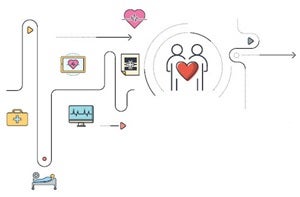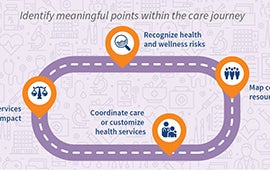
Empower your patients with
meaningful engagement to improve health outcomes.
Patient engagement leads to better health outcomes, reduced healthcare costs
and improved patient satisfaction.
 An engaged patient plays a more empowered role in deciding on a plan for their care, which can lead to better overall outcomes. Better patient engagement also can lead to the optimal allocation of resources needed to achieve those outcomes. Integrating data insights into existing clinical workflows enhances and drives that engagement.
An engaged patient plays a more empowered role in deciding on a plan for their care, which can lead to better overall outcomes. Better patient engagement also can lead to the optimal allocation of resources needed to achieve those outcomes. Integrating data insights into existing clinical workflows enhances and drives that engagement.
With these insights, healthcare providers, payers, pharmacies and life sciences organizations can support individual well-being, effective treatments and an improved patient experience.
Patient Engagement Improves Health Outcomes
When a patient is willing to fully engage in their treatment, both they and the provider can enjoy a number of benefits. Outcomes can be dramatically improved when a patient is invested and aware of the impact of medications, follow-up appointments and preventative steps.
When a person is involved in the decision-making, management of medical conditions and medication adherence, there is potential to lower costs for both parties. Patient engagement can create:
Better allocation of potentially finite
and valuable resources.
Meaningful patient/practitioner relationships that
encourage patients to stay invested in their well-being.
as a result of a better patient experience.
Improved value-based care quality ratings as a result of
people being willing to engage in more preventative care
activities and better managing their conditions.
engagement and patient satisfaction, which in turn
encourages organizational growth.
How Our Data Can Enhance Patient Engagement Strategies
LexisNexis Risk Solutions provides data and advanced analytics to empower your organization to facilitate and strengthen meaningful patient engagement. Our data insights can be integrated into existing systems or workflows to enhance patient engagement strategies.
Through this data integration, your organization can see a broader view of a person - beyond that one encounter - leading to a more holistic approach to care management. Here are some key considerations for achieving optimal patient engagement from a data perspective:

Solutions That Help Improve Patient Engagement
Ensure a Single Source of Truth
for Each Patient
Maintain Current and Accurate
Contact Information
LexID for Healthcare
![]() Our LexID® for Healthcare solution appends a set of unique, non-SSN based identifiers to each patient record, matching and merging duplicate medical records into one golden record per person.
Our LexID® for Healthcare solution appends a set of unique, non-SSN based identifiers to each patient record, matching and merging duplicate medical records into one golden record per person.
Having an individual’s information in one record ensures proper patient care, prescription management and treatment programs. This can improve patient safety and simplify administrative processes, which in turn can lower costs.
Keep Contact
Our Keep Contact solution can be seamlessly integrated into existing systems and operations to enable healthcare organizations to cleanse and augment their databases and ensure accurate and up-to-date contact information is used for outreach and other patient engagement efforts. This can then help to improve quality ratings, which optimizes reimbursement rates and minimizes financial penalties.
Utilize Social Determinants of Health Data
impacting medication adherence, readmission risk, engagement level, or other related outcomes.
Using data and analytics, organizations can then determine what additional resources a person may need to help
improve their medical conditions with LexisNexis Socioeconomic Health Attributes and Socioeconomic Health Scores.
Socioeconomic Health Scores and Socioeconomic Health Attributes
 With the shift to patient-centric services, providers must be able to determine the patients who need help, weigh their motivation to change, and then provide them with the right engagement tools. Social determinants of health data, including information on relatives and associates, assets, trends over time, neighborhood and household characteristics and more, can be utilized to improve patient engagement and risk stratification activities by understanding patients holistically and looking beyond traditional health information sources.
With the shift to patient-centric services, providers must be able to determine the patients who need help, weigh their motivation to change, and then provide them with the right engagement tools. Social determinants of health data, including information on relatives and associates, assets, trends over time, neighborhood and household characteristics and more, can be utilized to improve patient engagement and risk stratification activities by understanding patients holistically and looking beyond traditional health information sources.predicts an individual's
potential risk over the next
12 months based on cost.
predicts an individual's
potential risk of readmission
within 30 days after discharge
of an inpatient hospital stay.
medication adherence rate
within the next 12 months.
an individual's motivation level
to care for one's own health
over the next 12 months.
3 Steps for Building an SDOH Business Case
Supporting Patient Engagement Strategies Is Paramount
to meet your unique needs. Find out more about how our data and analytics can be integrated
into existing systems and workflows to improve care management and clinical outcomes.
How We Serve Healthcare Organizations
By Market
By Use Case
Data Security & Access Management
Provider Data Quality
Provider Network Management & Targeting
Social Determinants of Health
Healthcare Interoperability
Healthcare Tokenization





